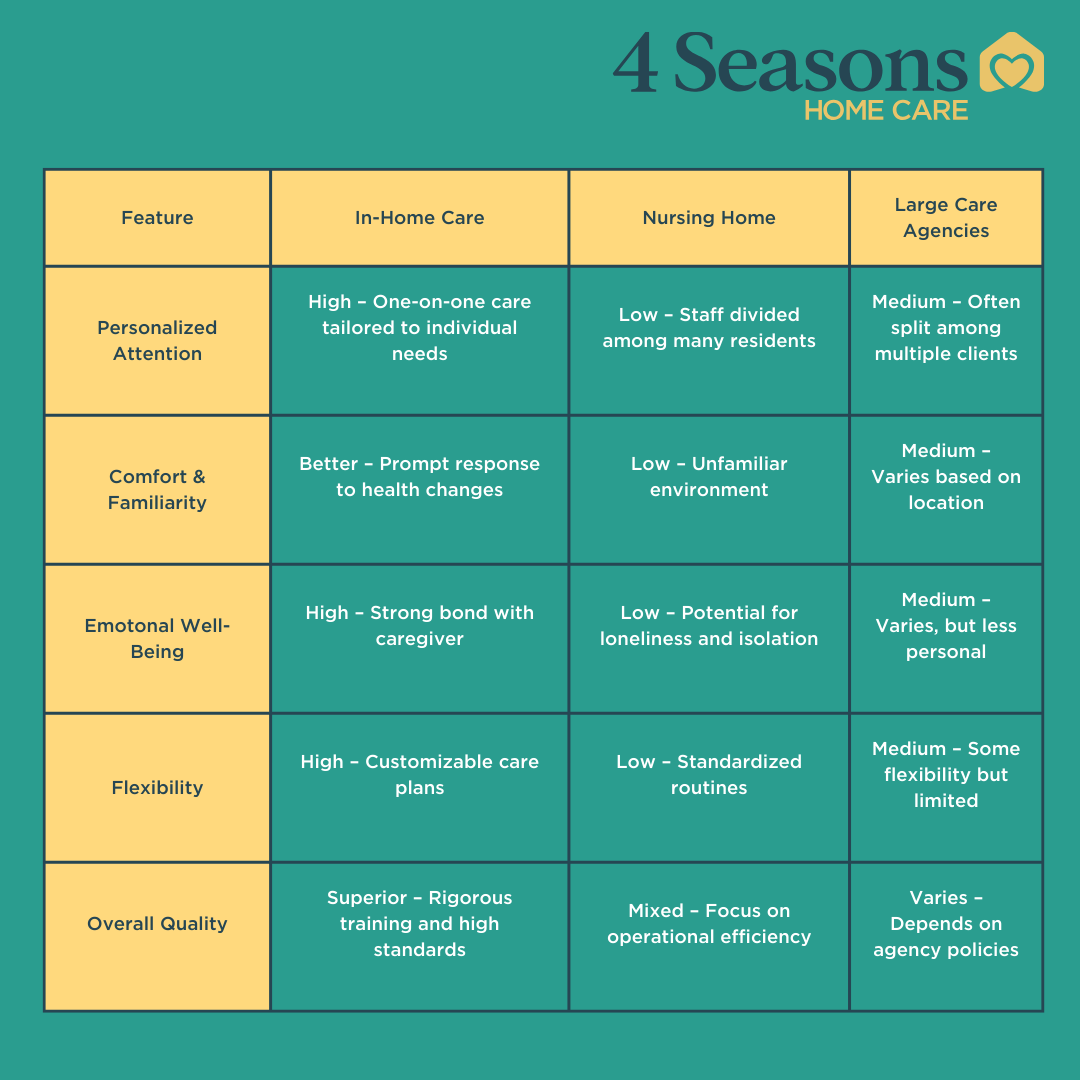Why Quality In-Home Care Matters: Personalized Attention, Better Outcomes, and Higher Standards
When it comes to caring for a loved one, the choice of care environment can significantly impact their well-being and quality of life. While nursing homes and large care agencies offer certain benefits, the personalized nature of quality in-home care stands out for three primary reasons: one-on-one care, better health outcomes, and higher overall quality compared to larger institutions. Let's delve into why these factors make quality in-home care a superior choice for many families.
See our summary comparison table below of in-home care versus other care options.

One-on-One Care: Personalized Attention and Emotional Support
One of the most compelling advantages of in-home care is the level of personalized attention your loved one receives. In a home care setting, caregivers are dedicated to a single individual or a small number of clients, allowing them to provide customized care tailored to specific needs and preferences.
This one-on-one care fosters a strong bond between the caregiver and the care recipient. Caregivers become familiar with the individual's routines, likes, dislikes, and unique health requirements, leading to a more responsive and attentive care experience. This personal connection is not only comforting but also essential for emotional well-being, as it helps reduce feelings of loneliness and isolation that are common among the elderly and those with chronic illnesses.
In contrast, in larger care facilities, staff members often have to divide their attention among numerous residents. This can lead to a less personalized approach, where individual needs might not be met promptly or adequately. The lack of personal attention in such settings can contribute to a sense of neglect and lower overall satisfaction with care.
Better Health Outcomes: Enhanced Monitoring and Prompt Response
Quality in-home care is closely linked to better health outcomes. With a dedicated caregiver, any changes in health or behavior can be quickly noticed and addressed. This prompt response is crucial in managing chronic conditions, preventing complications, and ensuring timely medical intervention.
For instance, in-home caregivers can help manage medications, ensure proper nutrition, and provide assistance with physical therapy exercises, all of which contribute to better health management. They can also coordinate with healthcare providers, ensuring that any changes in medical instructions are implemented immediately.
Studies have shown that individuals receiving in-home care often experience fewer hospitalizations and emergency room visits compared to those in institutional settings. The continuous monitoring and immediate care provided at home help catch potential issues before they escalate, leading to a more stable and healthy lifestyle.
In large care facilities, the ratio of caregivers to residents can make it challenging to maintain the same level of vigilance. The higher number of residents means that staff may not notice subtle changes in an individual's health status, potentially delaying critical interventions.
Higher Quality Care: Superior Standards and Individualized Services
The quality of care provided in an in-home setting is often superior to that of larger institutions. This is because in-home care services are typically more flexible and can be tailored to meet the specific needs of the care recipient. Families have the ability to choose caregivers who are the best fit for their loved one, ensuring a higher standard of care.
In-home caregivers often undergo rigorous training and are highly skilled in various aspects of personal and medical care. They are committed to maintaining the highest standards of care because their reputation and livelihood depend on it. This contrasts with larger institutions, where the focus may be more on operational efficiency than on individualized care quality.
Moreover, in-home care allows for a comfortable and familiar environment, which is especially beneficial for individuals with dementia or other cognitive impairments. Being in a familiar setting can reduce anxiety and confusion, promoting a sense of security and well-being.
4 Seasons Home Care: The Superior Choice for Personalized Care
Choosing quality in-home care means opting for a level of personalized attention, better health outcomes, and higher overall care standards that are difficult to match in larger care facilities. The one-on-one care model ensures that your loved one receives the focused, compassionate, and responsive care they deserve. This leads to a higher quality of life and greater peace of mind for both the care recipient and their family.
At 4 Seasons Home Care, we are dedicated to providing exceptional in-home care services that prioritize your loved one's unique needs and preferences. Our trained and compassionate caregivers are committed to delivering the highest standards of care, ensuring that your loved one remains safe, healthy, and happy in the comfort of their own home.
Contact us today to learn more about how our quality in-home care services can make a difference in your loved one's life.
